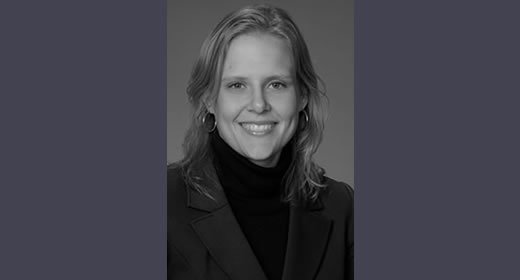
Here's something you might not know: more than 90 percent of American children have health insurance. While making sure that all U.S. children have coverage is the goal, this is definitely a win. And according to Elisabeth Wright Burak (MPP/MSW '01), senior program director for Georgetown University's Center for Children and Families (CCF), we can attribute this success story to Medicaid and the Children's Health Insurance Program. "A lot of it has to do with work that has happened at the state level," says Burak, "making it easier for families to sign up for healthcare coverage, taking a lot of red tape out of the system, and modernizing eligibility systems so kids don't drop off unnecessarily. Now we're in this exciting new era of health reform where states have the opportunity to make the same progress for parents and other adults who have no affordable coverage today—the whole family wins."
A research and policy center, CCF serves as a resource for state advocates, legislators, and policymakers—who do most of the work that gets children in America coverage and keeps them covered. The center looks at the healthcare system, asks how children and their families are faring, and makes recommendations based on research.
Burak refers to her primary role at CCF as "external affairs"—strategic communications and partner engagement. For example, she supports the center's coalition work with children's health organizations, advocacy, and research groups, such as the American Association of Pediatrics, the Children's Hospital Association, the Children's Defense Fund, First Focus, the Center on Budget and Policy Priorities, and many others. "CCF doesn't lobby," Burak explains, "so sometimes our partnership with the child health community entails us giving groups information on what we know about the policy issues. Then organizations that do lobby can use it to help move their policy agenda."
Burak adds that she lobbied all the time in her previous position as director of health policy and legislative affairs for Arkansas Advocates for Children and Families; in addition to improving access to Medicaid and CHIP in Arkansas, her accomplishments there included helping to increase access to school-based health, substance abuse, and afterschool programs. "It's interesting now to be at this intersection between research and policy development. There's always that challenge: how do you make research accessible to those who could use it and promote good public policy?"
Originally interested in welfare reform, Burak never expected to work in health policy, or education policy, yet her career has encompassed both. "It's one of the things I've really liked about all of my jobs; I can clearly see the relationships between these various policy issues. Because when it comes to low-income family issues, they all intersect all the time."
At the Ford School, Burak's interest in social welfare policy led her to Sheldon Danziger and to Ann Lin. "They cared deeply about what happened to their students and wanted them to land well, to succeed." She offers the same praise for the Ford School's Graduate Career Services. "Career services at the school are just top, top notch—Jennifer Niggemeier and her team. That department was a tremendous resource and source of support, certainly in terms of making connections. The Ford School opened a lot of doors for me in DC, especially in those first years after graduation."